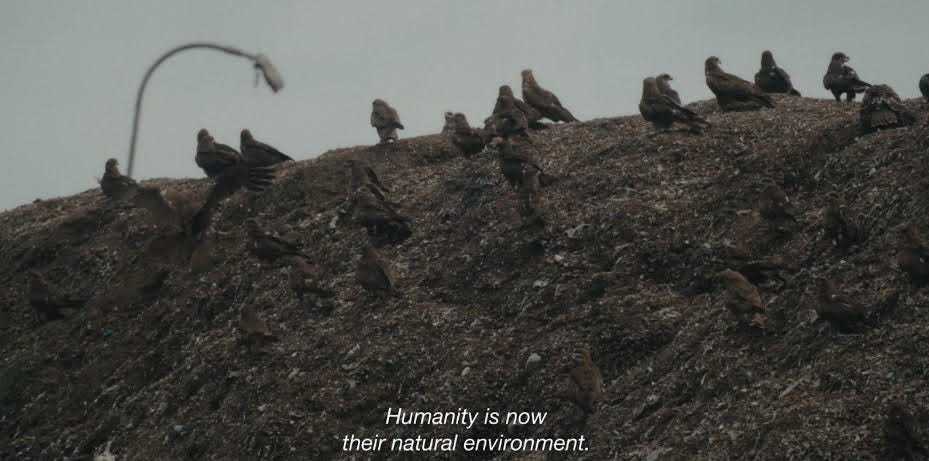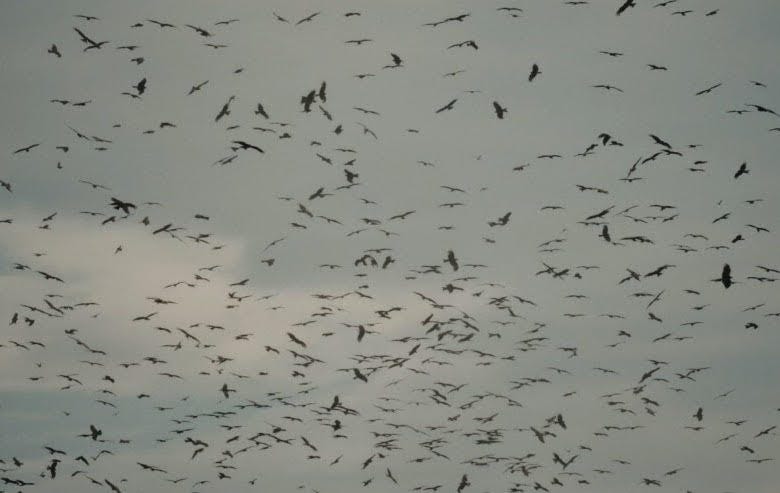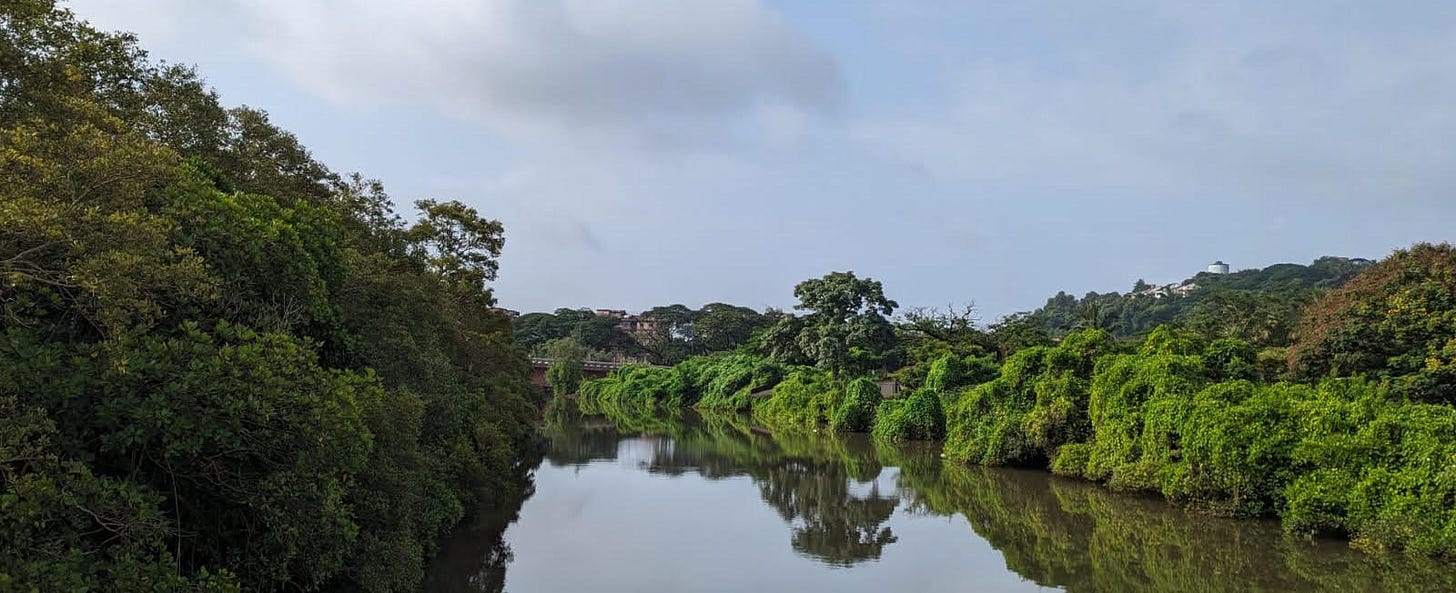Praani ki Kahani
Praani is a note by Agami on listening better to the voice of nature, ways of amplifying them, and finding pathways to bring them into our ways of governance. At Agami, we are deeply interested in how rivers, forests, animals, and even the winds and the stones, might speak into our deliberations on justice.
[This Note had originally gone out on September 20th, 2025]
Offerings For the Week
How to care for the profane? In Shaunak Sen’s All That Breathes, black kites wheel over Delhi’s urban breath, eating the city’s stench becoming guardians of what we would rather look away from; In today’s offering, Aditi’s reflection writes into that grief. And from Goa, a small dispatch on walking and letting the ground set the pace (a larger reflection to follow).
A Community of Air
All that Breathes by Shaunak Sen is a 2022 documentary about two brothers — Nadeem and Saud — ‘who devote their lives to the effort of protecting the black kite, a majestic bird of prey essential to the ecosystem of New Delhi that has been falling from the sky at alarming rates.’
The end credits is a shot that slowly pans over kites perched across a canopy of branches punctuated by names of crew members. This subtle and final reinforcement of the truth of interconnectedness that underlies the film, compounds the violence of our fractured living. The feeling that followed was grief that began as a pit in my stomach and snaked its way to my chest.
I don’t think the film intends to be fatalistic nor does it attempt to make a case for coexistence. It simply lays bare the fact that we are constantly coexisting. The narrator says of the kites - ‘Humanity is now their natural environment.’ Nannu, Saud’s son increasingly finds cigarette butts in the cage - the raptors have discovered that these keep parasites at bay. The opening scene of the film is of a murine colony amidst the squalor of Delhi. Another nocturnal scene with a pig and small band of horses by a nullah has the surreal quality of an urban fairytale. Some of the shots where a snail, a gecko, industrious ants, come to fore as the focus shifts to relegate human activity to the background were instances that caught my breath. Barthes describes it as punctum - a detail in an image that pierces the viewer’s consciousness, creating a profound, personal, and often unexpected emotional connection or “wound”.
In those shots, somewhere in the middle of the transition between foreground and background is a point when the scene is blurred, forms are undefined and merge into one another - you can’t tell the glistening body of the snail from fiery, raucous celebration in the gully. This is the precise moment of punctum for me. Speaking about their mother whose fables and stories were their doorway to animals and science, Nadeem and Saud say - ‘Jo jo cheezein saans leti hai, unke beech mein farak nahi karna chahiye. Ped, fungus, ghaas, natural aur supernatural unke liye mix ho jata tha’ (One shouldn’t differentiate between all that breathes. Trees, fungus, or vegetation, natural and supernatural worlds were mixed for her.)
Creating sharply contoured identities, the jagged edges of which allow for very little of the aforementioned ‘mixing’ that is elemental to life leads to an unnatural state of fragmentation in our being. It is the fundamental injustice we fail to see. The grief for me was the weight of this neglected truth, this incredulous blindspot.
Cheezon ki parvaah isliye nahi ki jaati
Kyunki unka desh, mazhab ya unki politics aap jaisi hai.
Zindagi khud ek tarah ki rishtedari hai.
Hum sab hawa ke biradri hai.
You don’t care for things because
they share the same country, religion or politics.
Life itself is kinship.
We are all a community of air.
Sparks from the Ground
The World Reveals Itself to Those Who Travel by Foot
Werner Herzog, patron saint of walking into volcanoes and insisting on dragging a ship across a mountain, said: the world reveals itself to those who travel by foot.
It’s a line that sounds trite until you realize that every other creature already knows this. Jackals, fiddler crabs, termites, otters all move at the pace their bodies were built for. Only humans insist on flooring the accelerator and then booking an hour at the gym to undo what we’ve done to ourselves. We’ve made “fitness” a subscription package because we spend nine hours in a glass tower and call it productivity.
Milan Kundera writes in Slowness that “speed is the form of ecstasy the technical revolution has bestowed on man.” A runner feels her weight, her age, her blisters. A motorcyclist feels nothing at all, body outsourced to the machine, ecstasy pure and disembodied. There is a secret bond between slowness and memory, between speed and forgetting. Slow down, and the world seeps in. Speed up, and you erase as you go.
A view I would have fully missed had I not insisted on lugging my suitcase from the bus stop to the hostel for 2 km.
At the Goa Multispecies Canvas, this truth kept surfacing subtly and insistently the way a fungal filament might push through soil. We sat in a circle and were asked to introduce ourselves not by degrees or jobs but by asking which other species we’d like to be for a day. The room filled with turtles, otters, ants, mycelium.
Later, in an embodiment exercise, we were asked not “what do you think?” but “where do you feel it?” The answers were bodily; a heaviness in the chest, a clenching of the jaw, an urge to feel mud underfoot instead of Kadapa stone. To travel by foot is about being honest in the one way that matters - staying in one’s body, staying in relation.
When we leave the world to machines and petitions, we end up with affidavits that can’t hear birdsong, and statutes that don’t recognize the tide. At Salvador do Mundo, for the Canvas, it became clear to me that we are the only deluded species, the only one trying to outrun itself. Everyone else is already home, already in step with the ground beneath them.







